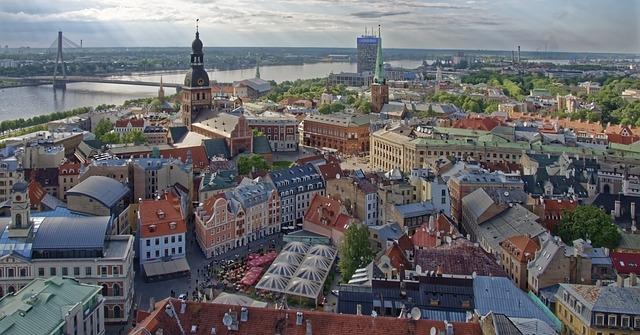On February 24, 2025, in a pivotal moment for regional diplomacy, Latvia, representing the Baltic States of Estonia and Lithuania, addressed the United Nations Security Council in New York. This statement not only underscored the collective stance of these nations but also highlighted their commitment to addressing pressing global security challenges.As members of the international community, the Baltic States are keenly aware of the geopolitical dynamics influencing their region and the broader world. This article delves into the key themes of Latvia’s address, exploring the implications for baltic cooperation, security initiatives, and the ongoing discourse within the United Nations on issues vital to peace and stability in Europe and beyond. Through this lens, we examine how the collective voice of the Baltic States seeks to influence both regional policy and international relations in an increasingly complex global landscape.
Statement Overview and Context of the Baltic states at the United Nations Security Council
The statement delivered by Latvia, representing the Baltic States of Estonia, Latvia, and Lithuania, underscores the unified commitment of these nations to the values and principles enshrined in the United Nations Charter. As small but resilient members of the international community,the Baltic States emphasize their dedication to multilateralism and collective security,especially in the face of evolving global threats. They call for a consolidated approach to address issues such as regional stability, human rights, and the promotion of democratic governance, which are fundamental to the security framework in the Baltic region and beyond.
Key points highlighted in the statement include:
- Support for Ukraine: Reinforcing solidarity with Ukraine in its fight against aggression and defending the rules-based international order.
- Cybersecurity initiatives: Addressing increasing cyber threats through cooperative measures and strengthening resilience.
- Sustainable Growth Goals: Advocating for the alignment of security policies with the fulfillment of the Sustainable Development Goals (SDGs) to ensure a comprehensive approach to peace and stability.
| Baltic States’ Initiatives | Description |
|---|---|
| regional Security Cooperation | Joint exercises and collaborations with NATO allies to enhance defense capabilities. |
| Human Rights Advocacy | Promotion of minority rights and democratic freedoms within and beyond their borders. |
| Climate Action | Integrating climate priorities into national security strategies to address existential threats. |

Key Issues Addressed by Latvia on Security and Stability in the Baltic Region
Latvia emphasizes the critical challenges facing the Baltic region, especially in the context of evolving security dynamics.The ongoing geopolitical tensions necessitate a unified response from the Baltic States to ensure stability and resilience. The following issues are central to the dialog:
- Military Presence and Collaboration: Strengthening the NATO presence in the Baltic region to deter aggression.
- cybersecurity Efforts: Enhancing cooperation between states to safeguard against cyber threats and promote information security.
- Energy Security: Reducing dependence on external energy sources and fostering regional energy cooperation for self-sufficiency.
- Regional Defense Initiatives: Developing coordinated defense strategies among Estonia, Latvia, and Lithuania to respond effectively to potential threats.
Additionally, Latvia stresses the importance of international dialogue and cooperation in addressing these issues. The following strategies are proposed to enhance stability:
| Strategy | Description |
|---|---|
| Joint Military Exercises | Conduct regular exercises to strengthen interoperability and readiness among Baltic forces. |
| Information Sharing | Establish platforms for real-time information exchange on security threats. |
| Community Engagement | Promote awareness and resilience among local populations regarding security issues. |

Collective Security: The Unified Stance of Estonia, Latvia, and Lithuania
The collective security agreement among Estonia, latvia, and Lithuania has emerged as a pivotal element in safeguarding the sovereignty and integrity of the Baltic region. In a rapidly changing geopolitical landscape,the tripartite solidarity of the baltic states articulates a relentless commitment to mutual defense,reflecting a deep-rooted understanding of the challenges posed by external threats. This unified stance emphasizes the importance of diplomatic dialogue and strategic partnerships, leveraging their combined influence in international forums such as the United Nations. The Baltic States are steadfast proponents of an enhanced NATO presence in the region, which is crucial for deterring aggression and ensuring stability in Eastern Europe.
Moreover, the collaborative defense architecture underlines core principles, including:
- Shared Intelligence: the flow of information between states strengthens their resilience against hybrid threats.
- Joint Military Exercises: Coordinated training and operations enhance operational readiness and interoperability among armed forces.
- Public Awareness Campaigns: Engaging citizens in national security matters fosters a culture of vigilance and preparedness.
In light of recent global events, the Baltic States remain committed to enhancing their defense capabilities, while also advocating for a constructive dialogue focused on diplomatic resolutions. The report shared at the United Nations Security Council underscores the imperative for sustained global attention and commitment to collective security frameworks,ensuring that the lessons of the past guide the path towards a secure future.

Recommendations for Strengthening Regional Cooperation and Defense Initiatives
To enhance the resilience and security of our region, it is indeed imperative that we prioritize collaborative frameworks that foster inclusivity and mutual support amongst nations. This can be achieved through initiatives such as:
- Joint Military Exercises: Regular and coordinated training operations to improve interoperability among our armed forces.
- Intelligence Sharing Agreements: Establish protocols that facilitate real-time exchange of critical information and analysis.
- Strategic Defense Partnerships: Strengthening alliances with NATO and othre regional organizations to bolster defense capabilities.
- Resource Pooling: Collaborating on defense procurement and technological development to ensure cost-effective and cutting-edge solutions.
- Public Diplomacy Efforts: Fostering awareness and understanding of our collective security goals among citizens and stakeholders.
Moreover, it is essential to engage in dialogues aimed at conflict prevention and crisis management. The following steps can be considered:
| Proposed Initiatives | Expected Outcomes |
|---|---|
| Regional Security Conferences | Enhanced policy formulation and consensus-building on defense strategies. |
| Cyber Defense Collaborations | Improved cybersecurity measures and resilience against hybrid threats. |
| Cultural and Academic Exchanges | Strengthened ties and greater understanding among our nations’ populations. |
by implementing these recommendations, we can fortify our collective defense posture and promote stability, ensuring that the Baltic region remains a safe and prosperous area for all its inhabitants.

The Role of International Partnerships in Enhancing Baltic Security Resilience
The Baltic States‚ÄĒEstonia, Latvia, and Lithuania‚ÄĒrecognise that robust international partnerships are crucial in fortifying our regional security landscape. In an evolving geopolitical climate characterized by uncertainty and increased threats, it is imperative that we collaborate closely with our allies to bolster defense capabilities and resilience. our commitment to transatlantic cooperation, particularly with NATO and the European Union, is integral to fostering a unified response to common challenges. These partnerships enable us to engage in joint military exercises, intelligence sharing, and technological innovation, enhancing our strategic deterrence and operational readiness.
To translate our shared vision into tangible outcomes, we focus on several key areas:
- Enhanced Military Cooperation: Joint training and interoperability initiatives with NATO forces.
- Cybersecurity Collaborations: initiatives aimed at strengthening defenses against cyber threats.
- Intelligence Sharing: Coordination of intelligence efforts to combat hybrid warfare tactics.
- Regional Security Dialogues: Platforms for discussing collective security measures and defense strategies.
By leveraging these areas of cooperation, we ensure that our nations not only defend against immediate threats but also build sustainable resilience for the future.

Future Prospects: Navigating Challenges in a Changing Geopolitical Landscape
As the geopolitical landscape evolves, the Baltic States recognize the myriad of challenges that lie ahead, necessitating a robust and united approach. Cooperation among nations has never been more critical in addressing security concerns and promoting stability in our region. Considering recent global events, the Baltic States advocate for a multi-faceted strategy that encompasses diplomatic engagement, defense collaboration, and support for international norms. This strategy should be underpinned by a commitment to human rights, democratic values, and the rule of law, which serve as the foundation for resilience and prosperity in Eastern Europe.
To effectively navigate these challenges, it is essential to focus on key areas of development and partnership. The following priorities stand out in our collective vision:
- Enhanced Defense Capabilities: Investing in modern military assets and maintaining strategic readiness.
- Cybersecurity Initiatives: Strengthening defenses against cyber threats that undermine our sovereignty.
- Economic Resilience: Diversifying economies and bolstering supply chains to reduce vulnerabilities.
- Regional Cooperation: deepening ties with neighboring countries to facilitate joint responses to crises.
To further support these objectives, collaborative frameworks must be established. The table below illustrates potential partnerships that could enhance our effectiveness in addressing both existing and emerging threats:
| Partner | Focus Area | Expected Outcome |
|---|---|---|
| NATO | Collective Defense | Increased military readiness |
| EU | Economic Cooperation | Stronger economic partnerships |
| Nordic Countries | Crisis Response | Enhanced response capabilities |
In Conclusion
the statement delivered by Latvia on behalf of the Baltic States at the United Nations Security Council on February 24, 2025, underscores the collective commitment of Estonia, Latvia, and Lithuania to uphold international law, promote regional stability, and advocate for democratic values. As the three nations navigate complex geopolitical challenges, their unified voice at this prestigious forum highlights the importance of solidarity among like-minded countries in addressing pressing global issues. this joint endeavor not only reaffirms the Baltic States’ dedication to security and cooperation but also sends a clear message of resilience in the face of adversity. As they continue to play an active role on the world stage,the Baltic States remain steadfast in their pursuit of peace,prosperity,and collective security.
















